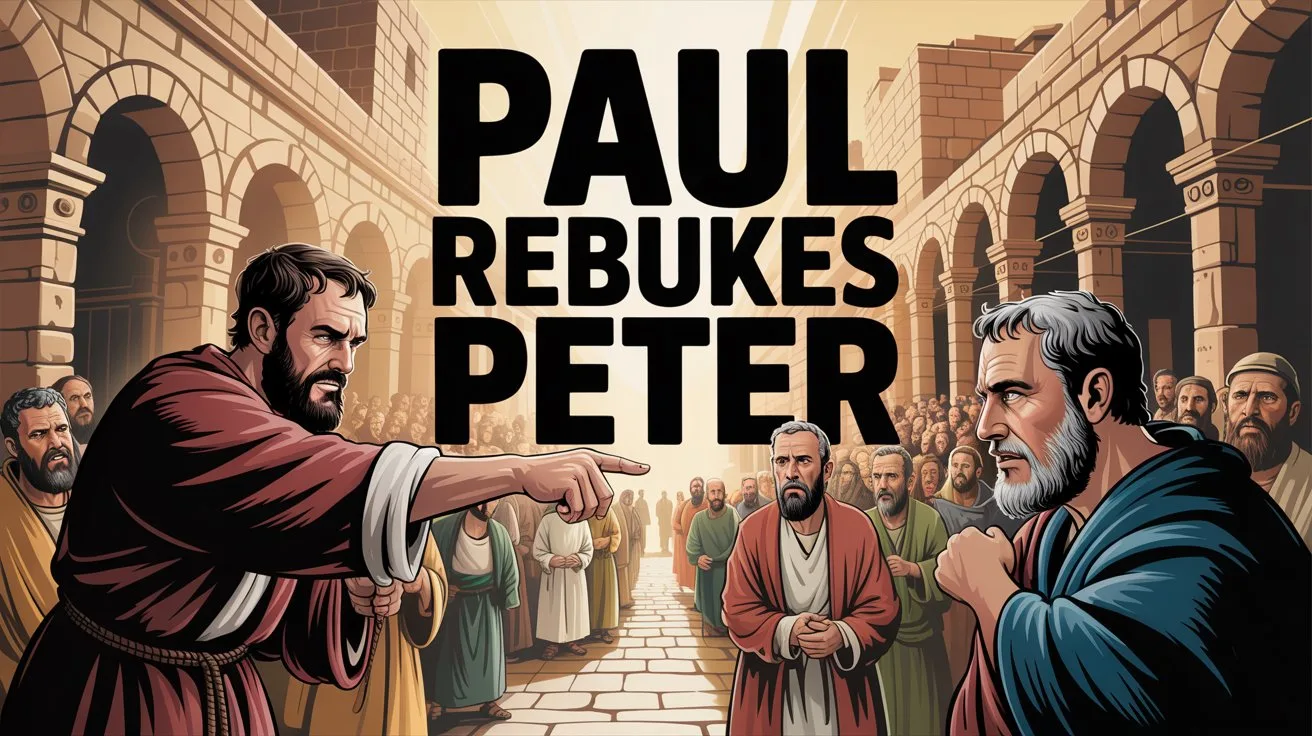One of the most striking confrontations in the New Testament occurs between two pillars of the early church, Paul and Peter. The event is recorded in Galatians 2:11–14, where Paul publicly rebuked Peter at Antioch. This passage raises important questions: What was the dispute about? Why was the rebuke so sharp and public? What lessons does this teach us about leadership, the Gospel, and unity in the church?
Gentiles and the Gospel
To understand this conflict, we need to remember the tension in the early church regarding Gentile converts. The Gospel was spreading beyond Jewish communities into Gentile regions. This created challenges about whether Gentiles had to keep the Law of Moses,which included circumcision, dietary laws, and ritual purity in order to be full members of God’s covenant people.
Peter himself had been used by God to open the door to the Gentiles in Acts 10, when he preached to Cornelius and his household:
“Then Peter opened his mouth and said: ‘In truth I perceive that God shows no partiality. But in every nation whoever fears Him and works righteousness is accepted by Him.’”
(Acts 10:34–35)
Peter saw the Holy Spirit fall upon Gentiles without them being circumcised or observing the Law (Acts 10:44–48). Later, he defended this before the Jerusalem Council:
“Now therefore, why do you test God by putting a yoke on the neck of the disciples which neither our fathers nor we were able to bear? But we believe that through the grace of the Lord Jesus Christ we shall be saved in the same manner as they.”
(Acts 15:10–11)
Peter clearly understood salvation was by grace, not by works of the Law. However, old habits die hard, and pressure from others would soon test his resolve.
The Confrontation at Antioch
Paul records the event bluntly:
“Now when Peter had come to Antioch, I withstood him to his face, because he was to be blamed; for before certain men came from James, he would eat with the Gentiles; but when they came, he withdrew and separated himself, fearing those who were of the circumcision. And the rest of the Jews also played the hypocrite with him, so that even Barnabas was carried away with their hypocrisy.”
(Galatians 2:11–13)
Peter initially ate freely with Gentile believers, recognizing their full acceptance in Christ. But when men “from James” arrived, likely Jewish Christians from Jerusalem who still held to strict observance of the Law, Peter drew back. His fear of their opinion caused him to act in hypocrisy. This wasn’t a minor social faux pas; it was a Gospel issue. By withdrawing from table fellowship, Peter implied that Gentile believers were second-class Christians unless they adopted Jewish customs.
Why Paul Rebuked Peter Publicly
Paul didn’t pull Peter aside for a private chat. He rebuked Peter “before them all” (Galatians 2:14). Why? Because the offense was public, and its impact was widespread. Peter was a leading apostle. His actions influenced others, so much so that even Barnabas, Paul’s close companion, was led astray. This was no longer a personal failing; it was a threat to the truth of the Gospel itself.
“But when I saw that they were not straightforward about the truth of the gospel, I said to Peter before them all, ‘If you, being a Jew, live in the manner of Gentiles and not as the Jews, why do you compel Gentiles to live as Jews?’”
(Galatians 2:14)
The heart of the issue was justification. Was it by faith in Christ alone, or did it require adherence to the Law? Paul refused to let Peter’s actions undermine the message he preached:
“Knowing that a man is not justified by the works of the law but by faith in Jesus Christ, even we have believed in Christ Jesus, that we might be justified by faith in Christ and not by the works of the law; for by the works of the law no flesh shall be justified.”
(Galatians 2:16)
If Paul had stayed silent, the Gospel of grace would have been compromised. Public error by a public leader required public correction for the sake of the church’s unity and doctrinal integrity.
The Issue of Hypocrisy
Paul doesn’t accuse Peter of ignorance, but of hypocrisy. Peter knew the truth; he had declared it at Cornelius’ house and before the council. His behavior, however, contradicted his conviction. Fear drove him to please men rather than stand firm in grace. Scripture warns against this:
“The fear of man brings a snare, but whoever trusts in the LORD shall be safe.”
(Proverbs 29:25)
This is a sobering reminder that even great leaders can falter when they fear human opinion more than God’s approval.
What Happened Afterward?
Galatians does not record Peter’s response, but other passages give us insight. There’s no indication that Peter harbored resentment or that this incident created lasting division. In fact, Peter later speaks warmly of Paul’s ministry:
“And consider that the longsuffering of our Lord is salvation—as also our beloved brother Paul, according to the wisdom given to him, has written to you…”
(2 Peter 3:15)
Peter calls Paul “beloved brother,” showing reconciliation and mutual respect. This demons/”>demonstrates humility on Peter’s part and reinforces that their shared commitment to the Gospel outweighed personal pride.
Doctrinal and Practical Lessons
This confrontation is rich with lessons for the church today. First, it underscores that the Gospel of grace must never be compromised. Adding any requirement (whether circumcision, dietary laws, or modern traditions) to the finished work of Christ perverts the Gospel (Galatians 1:6–9). Second, it reminds us that even leaders are accountable to the truth and to one another. The church is healthiest when correction, though painful, is embraced for the sake of faithfulness to Christ.
Finally, this passage warns us about hypocrisy. It is possible to believe the truth and yet act in a way that denies it. Our conduct must align with our confession. The world is watching, and inconsistency in leaders can lead many astray, as Barnabas was in this case.
My Final Thoughts
Paul’s rebuke of Peter was not about ego or rivalry; it was about preserving the purity of the Gospel. Peter stumbled, but he repented and continued to serve powerfully. The church remained united because both men submitted to the truth of God’s Word above personal feelings. In our age of compromise and fear of man, the courage of Paul and the humility of Peter are examples we desperately need.
The Gospel is worth defending, even when it costs us awkward conversations, broken pride, or public confrontation. Truth matters. Grace matters. And like Paul, we must be willing to stand, even when standing is hard.





 Get the book that teaches you how to evangelize and disarm doctrines from every single major cult group today.
Get the book that teaches you how to evangelize and disarm doctrines from every single major cult group today.